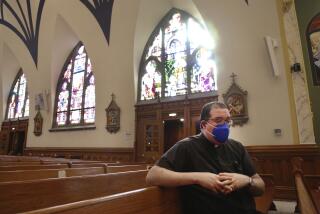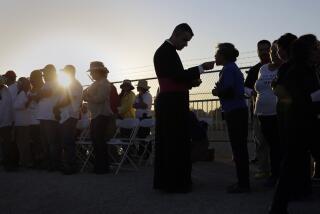Catholics Go to Mass Less Than They Say, Survey Says
Catholics say they go to church each week far more than they actually show up for Mass, a new study suggests.
Two University of Notre Dame sociologists spent 18 months studying how many people actually go to church each week and how many say they do. They found that only about 27% of Catholics attend church in a given week--far below the 51% suggested by a 1991 Gallup survey.
“Our study shows that half of those who say they are weekly churchgoers aren’t,” co-author James Cavendish said. “It’s startling because it’s conventional wisdom that Americans go to church on a pretty frequent basis. It’s written up in several scholarly reports that high attendance means Americans are perceived as highly religious.”
Cavendish and fellow researcher Mark Chaves used head counts of people in church at 48 Catholic dioceses on a typical weekend in October, 1990, then compared those counts to the total number of people in the dioceses who described themselves as Catholic. The 48 dioceses represented 38% of the U.S. Catholic population.
In only two dioceses was the church-attendance rate at or above the 51% reported by Gallup--in Owensboro, Ky., (67%) and Belleville, Ill. (58.4%).
The study was reported in the December, 1994, issue of the Journal for the Scientific Study of Religion.
“We think we’ve established that weekly church attendance for Catholics in the United States is about half of what everyone takes it to be,” Chaves said.
“It’s always been widely believed that upward of 40% of Americans are in church on any given weekend. That makes us look a lot more religious than the rest of the world. The study corrects the picture of how religious we are in terms of weekly church attendance.”
Chaves and two other researchers did a similar study in 1993 that included Catholics in 18 dioceses and Protestants in one Ohio county. They found an average weekly attendance at Mass of 28% for Catholics and 20% at Sunday services for Protestants.
Why the discrepancy between actual church attendance and what many people claim in surveys?
“I don’t think it means people are liars,” Chaves said. “It’s a well-known phenomenon in survey research that people over-report what they think is socially desirable behavior.”
People also may have forgotten what they did on a previous Sunday or may have responded with what they regularly do on Sundays, even if they departed from their routine and did not attend Mass, he said.
Despite the Notre Dame study’s conclusions, the Gallup organization stands by its data, a researcher who works closely with Gallup on religion polling said this week.
“There could be a lot of methodological factors that produce a lot of difference,” said Robert Bezilla, editor of the Princeton Religion Research Center Newsletter. “I have no reason to doubt the 51% figure.”
Bezilla said he could not respond thoroughly without seeing the Notre Dame study.
However, he said Gallup’s survey methods diminish the likelihood of exaggeration by asking people simply whether they have gone to church in the past seven days, not if they attend church.






